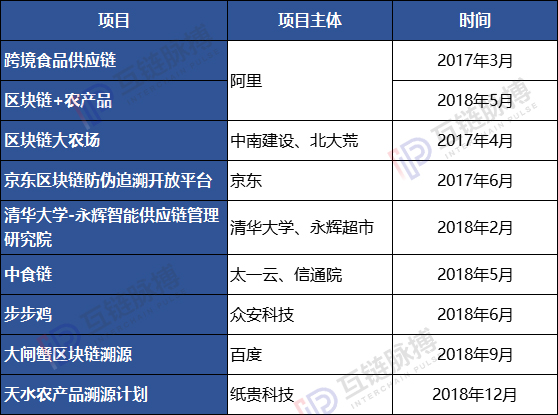The central document mentions the use of blockchains to solve food safety. Who else is in addition to BAJ?
On May 20, Xinhuanet was authorized to issue the "Opinions of the Central Committee of the Communist Party of China and the State Council on Deepening Reform and Strengthening Food Safety." Mutual chain pulse observation, opinions have been mentioned, promote the "Internet + food" supervision. Establish a food safety information platform based on big data analysis, and promote the application of blockchain and other technologies in the field of food safety supervision.
With the release of top-level documents, the food safety field has ushered in important development opportunities. The blockchain will also have a place in the solution of food safety issues through food traceability, product labeling, farm and dealer information storage.
In fact, as early as 2017, giants such as IBM, Ali, and JD.com have begun trials on “blockchain+food safety”. In August 2017, 10 retail and food suppliers, including Wal-Mart, Nestlé, Unilever and McCormick, partnered with IBM to integrate the blockchain into their supply chain, enabling food suppliers to trace materials more quickly. Ingredients and food are safer.
Giants start multi-enterprise layout "blockchain + food safety"
The development of the blockchain application in the domestic food safety field is similar to the overall development trend of the blockchain. It is also the first step for the giants, and the related applications of various enterprises have followed.
- Staking is essentially an inflation, why does it create the illusion of wealth?
- Interesting headlines – an unsuccessful experiment in the pre-blockchain era
- Guosheng Blockchain | Consensus Conference, Hangzhou Forum Double Star shines, China and the United States lead the world blockchain trend
In March 2017, Alibaba announced cooperation with PricewaterhouseCoopers, New Zealand Post and Fonterra to apply innovative technologies such as “blockchain” to promote a transparent and traceable cross-border food supply chain between China and New Zealand. Build a safer food market.
Subsequently, Alibaba proposed the concept of “blockchain+agricultural products” in May 2018, allowing agricultural growers to directly supply agricultural products from the fields to the urban table through the rural Taobao platform of Ali, to realize the standardization, scale and brand of agricultural products. It also allows users to purchase native agricultural products with peace of mind.
In April 2017, Zhongnan Construction (stock code: 000961) joined hands with Beidahuang (stock code: 600598) to establish a “good grain taste” to jointly build a block chain farm. Based on blockchain technology, Good Grain Taste Company develops a “system-base-farmer-standardized management model” to establish a closed-loop production-marketing eco-chain of high-quality rice from the origin to the table. At the end of 2017, the first batch of blockchain certified rice was sold in Jingdong Mall.
In June 2017, Jingdong Joint Quality Inspection Bureau, Ministry of Industry and Information Technology, Ministry of Commerce, Ministry of Agriculture and many brands jointly established the “Jingdong Quality Traceability Anti-Counterfeiting Alliance”, and also used the blockchain technology to build the “Jingdong Blockchain Anti-counterfeiting Traceability Open Platform”. After the platform is launched, the user can open the purchase order and obtain the traceability information by “one-click source tracking” or directly scanning the product trace source.

In February 2018, Tsinghua University-Yonghui Intelligent Supply Chain Management Research Institute was established. In November, Associate Professor Yang Lan of Tsinghua University introduced that blockchain and Internet of Things technologies have been applied to dozens of foods such as Xingcheng Duobao Fish, Boston Lobster, and Xiangcun Black Pork.
In May 2018, the China Food Chain Industry Alliance was formally established. It is reported that the China Food Chain is based on the technology of Taiyi Cloud (stock code: 430070) superconducting network and China Information and Communication Research Institute trusted blockchain product evaluation. Development, agricultural brands such as Wuchang Rice, Anhua Yuncha, and Zhangzhou Chain Orange have been on the chain. Consumers can scan the source code of the food from the field to the table by scanning the traceable source QR code and the anti-counterfeiting code through the food passport app published in the middle food chain, so that the whole production and operation activities of the food are under surveillance.
In June 2018, the “Step by Step Chicken” project, which combines blockchain, Internet of Things and anti-counterfeiting technology, was officially launched. The project is provided by Zhongan Technology (stock code: 06060) An Chain Cloud to provide blockchain technology. It is said that every step chicken wears an internet of equipment – chicken. The chicken card can record the data of each step chicken in each link, and the data will be uploaded and stored in real time. The consumer can use the mobile phone APP to trace the source anti-counterfeiting information when purchasing.
In September 2018, Baidu jointly launched the Crab Block Chain Traceability Program. After the crab farmers catch crabs, the crabs collect the hairy crabs, photos and crab certification crabs, and store the information transparently and safely on the blockchain. Consumers can use the AI crab face recognition technology to receive hairy crabs when receiving goods. The information is compared to the information recorded on the chain to ensure consistency in the information of each brand of hairy crabs and the place of origin.
In December 2018, Tianshui Chain, which was led by Tianshui Municipal Government and provided with blockchain solutions and technical support by Papers Technology, was officially launched. Using the blockchain technology, PaperGui Technology will record the information of apple production areas, planting orchards, picking time and testing certificates in Tianshui area, and realize the transparency and traceability of information from orchard to table. Consumers only need to scan. You can know.
Starting from the giants, but the development is not limited to giants such as Ali and Jingdong. At present, the application of blockchain in the field of food safety has involved foods such as apples, hairy crabs, rice, and oranges.
"Blockchain + food safety" still has constraints
Although, the application of blockchain in food safety and food traceability is gradually reaching a consensus. However, the application of blockchain technology is still incomplete and faces several key issues.
First of all, the most important issue is the "reality and security" problem. Blockchain technology can only guarantee that the data on the chain cannot be falsified, but it cannot guarantee the authenticity of the initial uplink data. This means that the food safety issues that consumers are most concerned about cannot be solved in essence. When companies face the problem of mapping data under this chain, the response is often to use a variety of technical means to deal with.
Secondly, the blockchain technology itself is still not mature. The technical requirements, the blockchain development and the high cost brought about by the operation and maintenance of the project operation are all unaffordable for ordinary enterprises. The application of blockchain technology is also difficult to bring benefits to the company. In the Great Northern Wilderness, it was stated in March 2018 that the first batch of blockchain certified rice of the company's shareholding blockchain company began to be pre-sold in Jingdong Mall in December 2017. There is currently no revenue for the company. This is also the constraint of the blockchain's large-scale application in this field.
Moreover, for the cultivation of consumers and suppliers' habits; whether consumers can accept the price difference caused by the cost of food traceability is a problem that enterprises need to face.
But at the same time, it needs to be understood that the blockchain will not change the ecology of China's food safety by itself. However, in terms of raising the level of supervision and reducing the difficulty of supervision, the food traceability is more operable, and it often has a certain contribution. With the continuous development of blockchain technology, the application effect in food safety and food traceability will become more and more obvious.
Author: Mutual chain pulse King-propelled vehicle
This article is [inter-chain pulse] original, reproduced please indicate the source!
We will continue to update Blocking; if you have any questions or suggestions, please contact us!
Was this article helpful?
93 out of 132 found this helpful
Related articles
- In order to promote the commercialization of a larger scale, the blockchain giants of Ali, Thunder, Baidu and Jingdong changed in spring and summer.
- Depth | The bottom of the question, is PoS really better than PoW?
- Depth | Read the seven big blockchain project foundation operation mode
- Continued to update Zhong Chang Zhao Changpeng live "review" theft, announced that no block reorganization, but was smashed
- PoW and PoS debate: Who has real openness? Who can stay away from the end of thermodynamics?
- If Buffett doesn't touch Bitcoin and gold, would you dare to vote for Bitfinex's LEO?
- Babbitt column | Coin East, new species?






